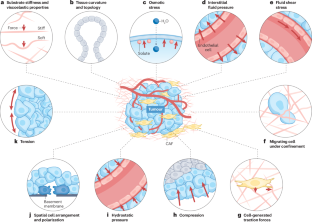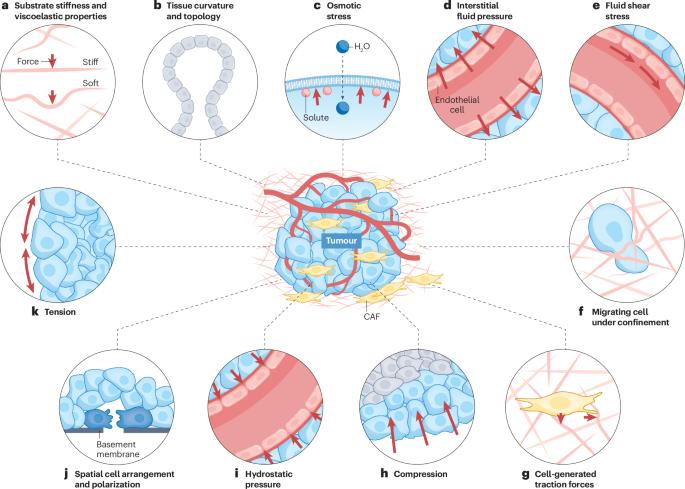癌症中的压缩应力:特征描述及其对肿瘤进展和治疗的影响
IF 66.8
1区 医学
Q1 ONCOLOGY
引用次数: 0
摘要
除了许多公认的生物畸变外,实体瘤还会造成异常的物理微环境,从而助长癌症的发展并产生抗药性。机械力对肿瘤的影响跨越一系列生物大小和时间尺度,从涉及其感应和传递的分子水平的快速事件,到较慢和更大规模的事件,包括克隆选择、表观遗传变化、细胞侵袭、转移和免疫反应。由于在生物系统中研究这些动态刺激所面临的挑战,尽管与癌症的病理生理学、侵袭性和治疗耐受性有明显的相关性,但对异常升高的机械力所引发的效应和途径的机理理解仍然难以捉摸。在本综述中,我们将探讨物理力在实体瘤中新出现的各种作用,并为理解实体应力机械生物学提供一个全面的框架。我们首先回顾了机械力(尤其是压应力)的生理重要性,并讨论了它们的定义特征、生物学背景和相对大小。然后,我们解释了异常压应力是如何在肿瘤中出现的,并描述了研究这些机械诱导过程所面临的实验挑战。最后,我们讨论了缓解实体应力的机械治疗方法的临床转化及其与化疗、放疗和免疫疗法协同作用的潜力。本文章由计算机程序翻译,如有差异,请以英文原文为准。


Compressive stresses in cancer: characterization and implications for tumour progression and treatment
Beyond their many well-established biological aberrations, solid tumours create an abnormal physical microenvironment that fuels cancer progression and confers treatment resistance. Mechanical forces impact tumours across a range of biological sizes and timescales, from rapid events at the molecular level involved in their sensing and transmission, to slower and larger-scale events, including clonal selection, epigenetic changes, cell invasion, metastasis and immune response. Owing to challenges with studying these dynamic stimuli in biological systems, the mechanistic understanding of the effects and pathways triggered by abnormally elevated mechanical forces remains elusive, despite clear correlations with cancer pathophysiology, aggressiveness and therapeutic resistance. In this Review, we examine the emerging and diverse roles of physical forces in solid tumours and provide a comprehensive framework for understanding solid stress mechanobiology. We first review the physiological importance of mechanical forces, especially compressive stresses, and discuss their defining characteristics, biological context and relative magnitudes. We then explain how abnormal compressive stresses emerge in tumours and describe the experimental challenges in investigating these mechanically induced processes. Finally, we discuss the clinical translation of mechanotherapeutics that alleviate solid stresses and their potential to synergize with chemotherapy, radiotherapy and immunotherapies. In this Review, Linke, Munn and Jain provide a framework for understanding solid stress mechanobiology, examine the emerging and diverse roles of elevated compressive stresses in solid tumours, and highlight the potential for targeting mechanical abnormalities in cancer.
求助全文
通过发布文献求助,成功后即可免费获取论文全文。
去求助
来源期刊

Nature Reviews Cancer
医学-肿瘤学
CiteScore
111.90
自引率
0.40%
发文量
97
审稿时长
6-12 weeks
期刊介绍:
Nature Reviews Cancer, a part of the Nature Reviews portfolio of journals, aims to be the premier source of reviews and commentaries for the scientific communities it serves. The correct abbreviation for abstracting and indexing purposes is Nat. Rev. Cancer. The international standard serial numbers (ISSN) for Nature Reviews Cancer are 1474-175X (print) and 1474-1768 (online). Unlike other journals, Nature Reviews Cancer does not have an external editorial board. Instead, all editorial decisions are made by a team of full-time professional editors who are PhD-level scientists. The journal publishes Research Highlights, Comments, Reviews, and Perspectives relevant to cancer researchers, ensuring that the articles reach the widest possible audience due to their broad scope.
 求助内容:
求助内容: 应助结果提醒方式:
应助结果提醒方式:


